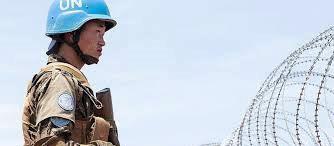Russia abstained on Friday in a UN Security Council vote to extend a peacekeeping mission in South Sudan because the US-drafted resolution did not prioritize peace.
The remaining 14 UN Security Council members voted for the renewal of the UN Mission in South Sudan (UNMISS) for an additional year till March 15, 2020, while maintaining its ceiling of 17,000 troops, including a Regional Protection Force authorized to take robust action where necessary, and a police ceiling of 2,101 personnel.
The Council decided that the UNMISS mandate will include protection of civilians; fostering a secure environment for the safe return or relocation of internally displaced persons and refugees; creating suitable conditions for the delivery of humanitarian assistance; monitoring and investigating human rights violations; and supporting implementation of the revitalized peace deal and the peace process.
The Council also requested that UNMISS strengthen its activities in preventing and responding to sexual and gender-based violence response activities, including by ensuring that the risks related to such crimes are documented in its threat analyses and early-warning measures, and by engaging with victims and women’s organizations.
Despite its abstention, Russia said it supported the peacekeeping mission in South Sudan.
"We are concerned that the document, which is supposed to clearly outline the mandate of peacekeepers, is overburdened with formulations and wording on gender issues and human rights," Russian First Deputy Permanent Representative to the United Nations Dmitry Polyanskiy said. "The latter is placed higher in tasks of the mission than the implementation of the peace agreement."
He emphasized that peacekeeping matters should be discussed in the Special Committee known as the “C34”, which cannot be circumvented. He said the United States delegation abused its prerogative as penholder by refusing to take the perspectives of other delegations into account.
Dmitry pointed out that the South Sudan parties have demonstrated readiness to compromise, and that significant progress has been registered since the revitalized peace deal was signed, warning that the stubborn refusal by some States to recognize the viability of the Khartoum Agreement “sent the wrong message” to the parties.
In September 2018, South Sudan’s President Salva Kiir and several opposition leaders, including main opposition leader Riek Machar signed a peace deal to end the civil war that has claimed thousands of lives and displaced millions of people since the beginning of the conflict in December 2013.




